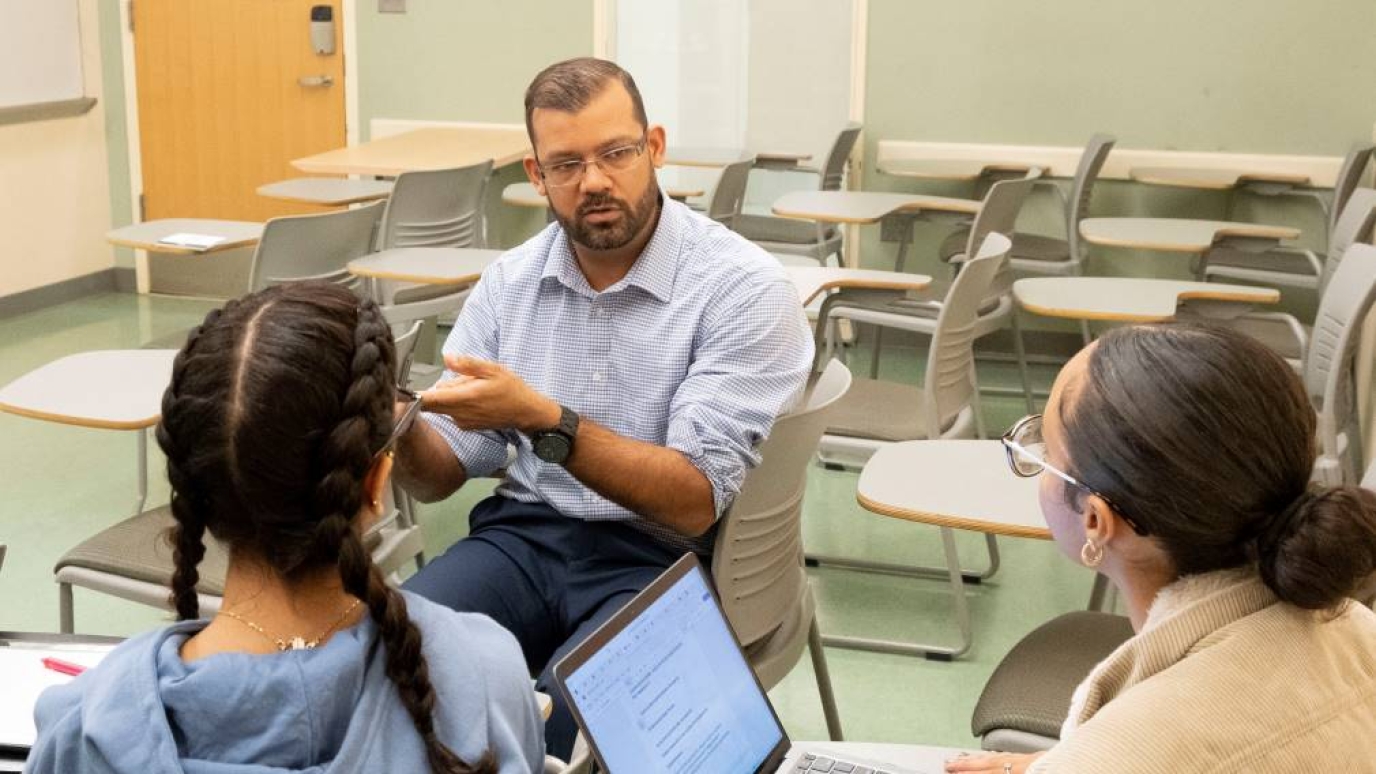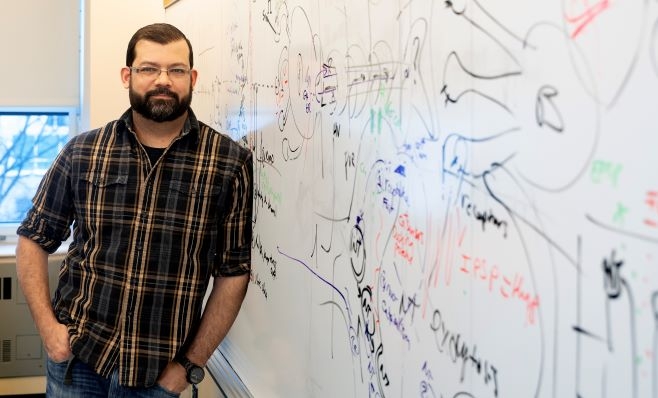
Lorenz S. Neuwirth, Ph.D., a professor and researcher focused on Biopsychology, Developmental Behavioral Neuroscience and Neuropsychology at the State University of New York at Old Westbury, has had his scholarly pursuits and impact in his field recognized by being named a fellow by two distinctive, prestigious organizations.
The Business Higher Education Forum has named him a 2025 Faculty Innovation Fellow and the American Psychological Association granted him fellow status.
"I am truly honored to be selected by these prestigious organizations for my research innovations that are shaping education and the public health sectors,” said Neuwirth.
A member of the SUNY Old Westbury faculty since 2015, Neuwirth is a tenured professor in the campus’ Psychology Department. In addition to his teaching responsibilities, he conducts research through the SUNY Neuroscience Research Institute, based on the Nassau County, New York, campus.
"We are very proud to have a scholar of Dr. Neuwirth’s caliber on our campus,” said David Lanoue, provost and senior vice president for academic affairs. “He deeply deserves the recognition that he has received from his peers across the field of Psychology.”
Business Higher Education Forum Faculty Innovation Fellowship
As one of 28 Business Higher Education Forum Faculty Innovation Fellows chosen through a competitive national search, Neuwirth is participating in an intensive nine-month experience designed to align education with industry needs, acquire critical skills to grow and sustain the innovation and leadership skills for faculty, and ultimately enhance student success outcomes through the creation of new industry partnerships.
Each fellow's work is meant to bridge the gap between academia and industry while fostering innovation, workforce readiness, and accelerating student success.
“It is a privilege to be selected nationally by the Business Higher Education Forum to develop new intrapreneurial skills and begin to forge new avenues for developing community partnerships that will help students at Old Westbury bridge skill acquisition gaps between education and industry,” said Neuwirth. “My efforts over the next nine months will serve to develop a program to propel students forward to help them achieve greater returns on investment for earning a degree at Old Westbury and these partnerships are more critical today than ever before.”
The Business Higher Education Forum Faculty Innovation fellowships are centered around each participant’s capstone project, which are meant to bridge the gap between academia and industry while fostering innovation, workforce readiness, and accelerating student success.
Neuwirth’s project, “Error-Based Learning through Virtual Reality,” is described by the Forum as “a bold attempt to teach undergraduate students neuroscience methods through procedural first-person point-of-view learning in a real-world virtual reality experience to learn through their own errors without consequences.”
“The methodology that I am creating will serve to teach undergraduate students job market ready skills for government and private research, bio-medical industry, and pre-clinical early drug discovery in big pharma,” explains Neuwirth, citing the hundreds of pharmaceutical and biotechnology companies in and near Long Island as employment opportunities for Old Westbury students. "Students usually don’t obtain job readiness training for these employers until they get to the master’s or doctoral levels and now, we get to teach them these skills at the undergraduate level without needing tremendous resources. This innovative approach will serve to close a huge job market readiness gap and allow our students access to these jobs right after they complete their bachelor’s degree.”
Neuwirth kicked off his journey as a fellow at San Diego State University’s Mission Valley campus in early February 2025. The fellows will also gather later in the year in the Virginia Tech Innovation Campus in Rosslyn, Virginia, and will close out their experience in Dallas, Texas at the State Farm Mutual Insurance Co.’s Richardson campus.
The Business-Higher Education Forum is a national network connecting pioneering corporate and higher education leaders to identify emerging skills and co-develop inclusive pathways that address talent needs. The group seeks to empower and catalyze collaborations that deliver accelerated, inclusive, and effective solutions across education and work and to meet the changing talent needs of learners, workers, and businesses.
American Psychological Association Fellow
Earning Fellow status from the American Psychological Association (APA) is an honor bestowed upon members of the organization who have shown evidence of unusual and outstanding contributions or performance in the field of psychology.
“I am humbled to be recognized by the American Psychological Association for my work over the last 20 years trying to identify a potential treatment for children will low-level lead exposures and that a viable treatment may be within reach,” said Neuwirth.
APA Fellow status requires that a person's work has had a national impact on the field of psychology beyond a local, state or regional level.
Fellow status requires that a person's work has had a national impact on the field of psychology beyond a local, state or regional level.
A member of the APA since 2003, Neuwirth’s line of preclinical research focuses on understanding how lead exposure disrupts the brain in early development when it is establishing proper circuitry and balancing excitability, how it causes sex-dependent differences in fronto-executive functions, and how these problems can be reduced by taurine treatments.
In collaboration with Bright U. Emenike, Ph.D., an associate professor of Chemistry and Physics at SUNY Old Westbury, Neuwirth has submitted two provisional patents for psychopharmacological treatments to ameliorate low-level lead poisoning through taurine and its derivatives.
“Currently, there is no drug medication to treat low-level lead exposure, and we are pioneering the first attempts addressing this long-lasting problem,” said Neuwirth. “I must acknowledge Dr. Emenike, as without his partnership, brilliance, and genuine friendship I do not think these achievements benefiting society would be possible – these fellowships are as much his recognitions as they are mine.”
Neuwirth’s and Emenike’s current work seeks to identify specific taurine derivatives as treatments for sex-specific and developmental time-period dependent neurobiological deficits induced by lead poisoning. Their work could lead to a clinical trial soon to see how the taurine-specific therapy may help protect and recover children’s brains that have been diagnosed with lead poisoning.
In addition, he has advocated for the American Psychiatric Association to update the “Diagnostic and Statistical Manual of Mental Disorders, 5th Edition” to include lead poisoning within the neurodevelopmental disorder classifications to formally recognize this condition to improve earlier and more accurate blood lead level screenings and access to early intervention in education.
In 2022, Neuwirth was recognized by the APA with the Early Career Psychopharmacologist Award. The award, given by Division 28 Psychopharmacology and Substance Abuse, recognized him for his work on developing new preclinical pharmacological treatments addressing issues posed by lead poisoning. In 2018 he was also recognized by the APA with the “Brenda Milner Award” from Division 6 the Society for Behavioral Neuroscience and Comparative Psychology for his breakthrough research on identifying lead poisoning effects on the frontal lobes of the brain and recovering it with taurine.,
Neuwirth is the third faculty member in the campus’ history to earn APA Fellow status, alongside Distinguished Service Professor Fred Millan and Professor Emeritus F. Michler Bishop.
The APA is the leading scientific and professional organization representing psychology in the United States, with 173,000 researchers, educators, clinicians, consultants, and students as its members and supporters. Its mission is to promote the advancement, communication, and application of psychological science and knowledge to benefit society and improve lives.
More about Lorenz Neuwirth
Neuwirth has authored or co-authored over 60 peer-reviewed and scholarly articles and presented over 40 times at national and international academic and research conferences and symposia. He is a regular peer-reviewer for over 40 scientific journals across disciplines that intersect with neuroscience. Neuwirth is also the President-elect for the national organization Faculty for Undergraduate Neuroscience (FUN).
Along with the 2022 and 2018 APA awards, in 2024 he was inducted into the Sigma Xi Scientific Research Honor Society, in 2023 he was recognized with “the Nhu Rho Psi National Honor Society in Neuroscience Outstanding Faculty Member of the Year”, in 2020 “the SUNY Chancellors’ Award for Excellence in Teaching”, and in 2018 as the Faculty for Undergraduate Neuroscience "Carol Ann Paul Educator of the Year" for his teaching and research commitment for undergraduate students at Old Westbury, and his development of a behavioral neuroscience and neuropsychology laboratory at the University. Neuwirth is also appointed by New York State Governor Kathy Hochul as an Educator Member of the state-wide Advisory Council on Lead Poisoning Prevention.
Neuwirth earned his Ph.D. in Biology/Neuroscience from The CUNY Graduate Center, New York, New York, after completing his second master’s degree an M.Phil. Biology/Neuroscience at the same institution, his first master’s degree was a M.S. in Neuroscience, Mental Retardation and Developmental Disabilities and his B.A. in Psychology he earned at The College of Staten Island, Staten Island, New York.
In addition, he served as a Charles E. Scheidt Post-doctoral Fellow in the Institute for Genocide & Mass Atrocity Prevention at Binghamton University, Binghamton, New York. He also was a National Institutes of Health of Environmental Health Sciences post-doctoral fellow in Neurotoxicology, Neurodegenerative Disorders and Molecular Epigenetics at Thomas Jefferson University in Philadelphia, Pennsylvania.

